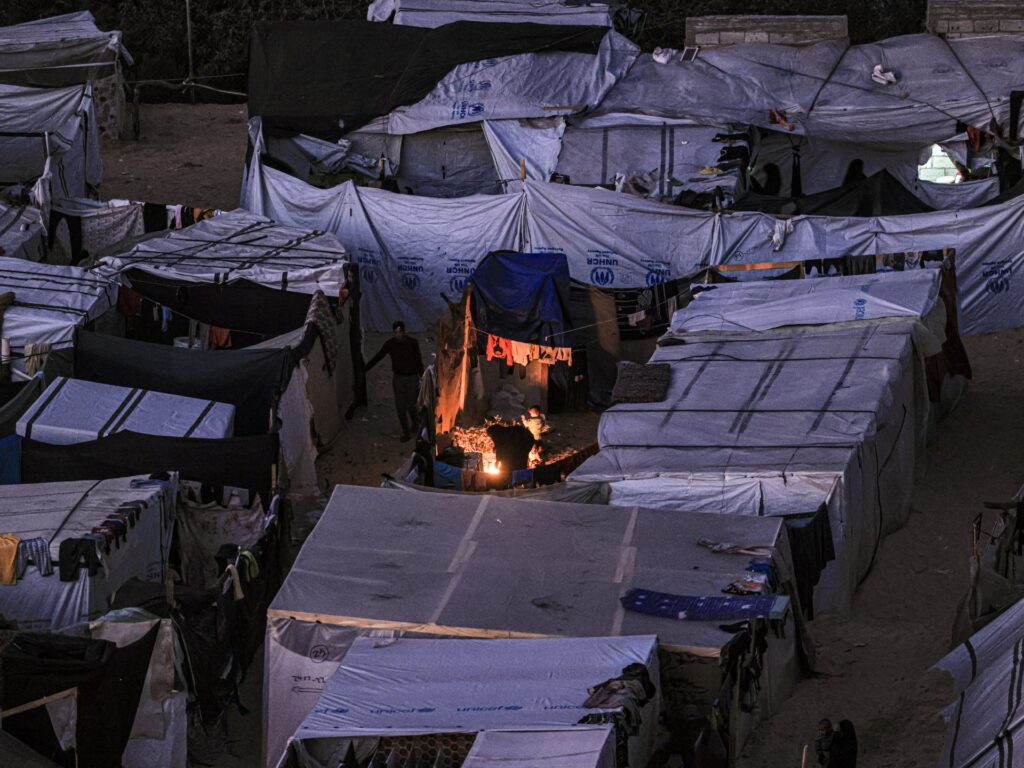In a tent made of cloth and plastic set up in the open south of the city of Rafah, south of the Gaza Strip, Ismail Nabhan sits with his children and grandchildren in front of a stove to get some warmth. The cold is bitter, and the tent struggles with strong winds in an attempt to withstand.
Nabhan (60 years old) says, “Two days ago the wind was strong. We tried all night to fasten the nylon to the tent. We live in a desert, and the sea is in front of us. It is doubly cold.”
The tent, in which 28 people live, emits a foul odor due to the burning of firewood and plastic materials, and choking smoke fills the place.
Raeda Awad (50 years old), Ismail Nabhan’s wife, says, “The smoke we inhale from burning plastic burns our chests.”
The tent of the family that was displaced from the center of the Gaza Strip is one of thousands of displaced persons’ tents established in the south of the besieged Strip, and it is hundreds of meters away from the shore of the Mediterranean Sea in the far southwest of the city of Rafah, near the border with Egypt.
Next to Raida, her grandson is coughing. She says, “All the children are sick from the smell and the cold. They do not stop coughing and running cold. The clothes are not heavy enough to keep them warm.”
She added, “The covers are not nearly enough. Every three people share one blanket.”
Raeda asks her son Hatem to bring some firewood. She says, “The firewood is wet. We will need 4 days to dry it, enough for a day or two to heat and cook for 30 people. The situation is tragic.”
Since Operation Al-Aqsa Flood, the Israeli army has been waging a devastating war on Gaza that, as of Monday, has left 24,100 martyrs and 60,832 injured, according to data from the Ministry of Health in the Strip.
Fear of freezing to death
The number of displaced people in the Gaza Strip is estimated at about 1.9 million out of approximately 2.2 million people, the total population of the Strip.
A joint statement by the World Health Organization, the World Food Program and the United Nations Children’s Fund (UNICEF) yesterday, Sunday, confirmed that there is an “urgent need” in the Gaza Strip for a “radical change in the flow of humanitarian aid.”
The statement called for “safer and faster” supply routes, warning that the current level of aid “is far below what is needed to avoid a deadly combination of hunger, malnutrition and disease.”
The United Nations Humanitarian Aid Agency (OCHA) said in its report on Sunday that the shortage includes “two million 200,000 blankets and mattresses, at least 50,000 family tents prepared for the winter and 200,000 pieces of winter clothing, in addition to tarpaulins and plastic sheets.”
In Rafah, Muhammad Kahil, displaced from the northern Gaza Strip, says, “We have no food, no water, and no heating. We freeze to death.”

Haneen Adwan, a mother of six children, was also displaced from the Nuseirat camp in the middle of the Gaza Strip to Rafah. She says, “At night, I feel like we are going to die from the cold. We are all sick, suffering from colds and coughs.”
Hanin (31 years old), whose tent is hundreds of meters from the sea, places three mattresses on top of each other to protect herself from the cold.
She says, “There is no means of heating other than fire, but the price of firewood is high and we do not have money. We light the fire with plastic, and we suffocate from the smell.”
Next to her sits her son Fadi (14 years old), who is preparing plastic to light the fire. Pointing to his hands, which were dyed black, the boy says, “I go there near the sewage ponds at the border. There is plastic underneath the sand. Every day I dig and cut the plastic with a knife.”
He says, not caring about the wounds covering his hands as a result of this work, “My brothers die from the cold at night, and so do I. We must light something, otherwise we will freeze.”
No safe haven
In a nearby tent, Khaled Faraj Allah (36 years old) prepares bread for his family of 6 children, including a child with special needs.
Faraj Allah, who was displaced from his home east of Gaza City, bakes loaves of bread in the corner of the tent and hands them to his son.
He says, “After two in the morning, no one is able to sleep because of the extreme cold, even if I put a thousand blankets. The ground is cold and the dirt transmits moisture and cold.” His six children share three mattresses.
The father struggles between lighting a fire to keep warm and his fear of bombing. He says, “We have become concerned that they (the Israeli occupation army) might bomb for any reason.”
The father refers regretfully to his child, Sanad. He says, “He was interacting and laughing, but he became always silent and did not move, especially since he was sick all the time because of the cold and did not get any medication.”
Faraj fears rain and the Israeli invasion. He says, “If it rains heavily, people will die from the cold, and if the Israelis invade the area, what will I do? I will flee there for the sake of my children,” pointing to the Egyptian border.

